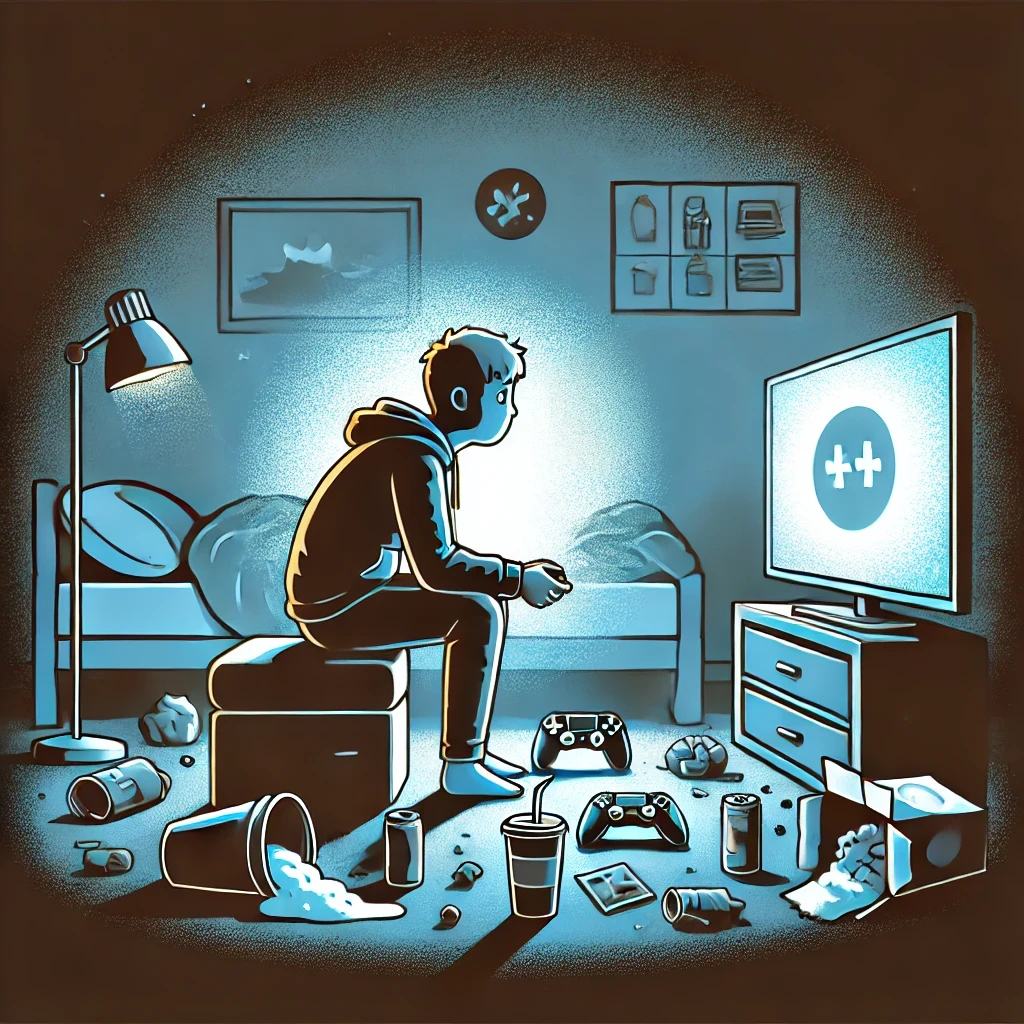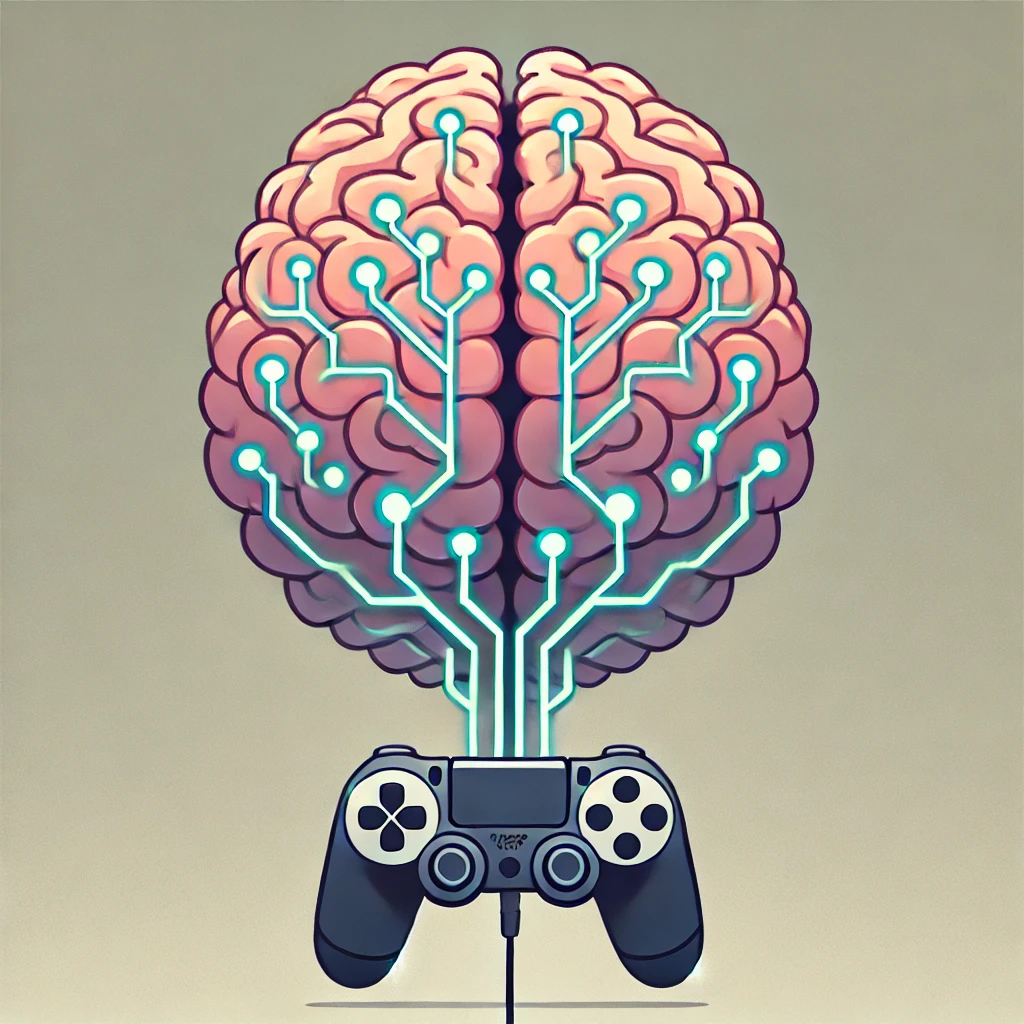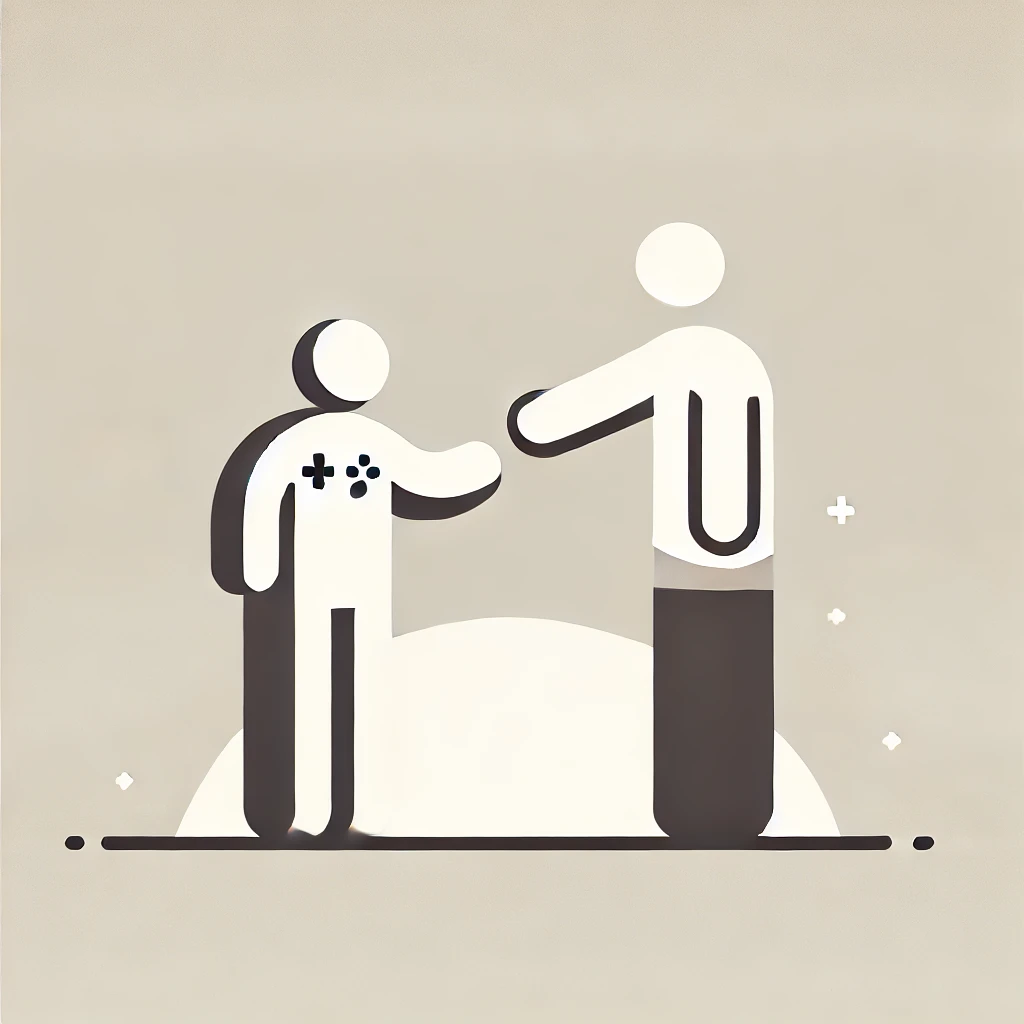
A few matches at the end of the day is a completely normal way wind down. Back in 2012, the number of gamers worldwide came at around 1.2 billion. Recent numbers put this figure at up to 3.2 billion gamers worldwide. It's an undeniable truth that playing video games has become a normal part of the life of up to 40% of the human population. However, when you start to play video games excessively, this can begin to form into a very real addiction.
Like any other recreational activity, anybody can develop an addiction and develop a toxic relationship with their hobbies. Do you ever feel like you keep queuing up for games, even though you actively hate playing? Is gaming taking time away from your responsibilities, whistling hours away in what seems like a few minutes? Do you feel like the hobby has control over you?
If you are developing a toxic attachment to your favorite hobby, it's important to recognize the symptoms of video game addiction.
The World Health Organization defines internet gaming disorder (IGD) or videogame addiction as "being characterized by impaired control over gaming, increasing priority given to gaming over other activities to the extent that gaming takes precedence over other interests and daily activities, and continuation or escalation of gaming despite the occurrence of negative consequences".
Unlike many traditional addictions, internet gaming disorder spans all demographics. Both adults and children are at risk, with studies showing that young males are particularly prone to excessive gaming due to factors such as age, impulse control, and social dynamics. The fact that this addiction is driven by behavioral patterns rather than chemical dependency makes it challenging to classify and understand. However, the impacts are no less real and can be highly damaging if not addressed early.
If gaming has started taking over your daily routine, it might be time to consider starting fresh. A level 30+ unranked smurf account can help you rediscover the fun of gaming while maintaining balance in your life.
Understanding the causes and risk factors of video game addiction is essential to identifying those most at risk. Although anyone can become addicted to video games, research has pinpointed several factors that heighten the likelihood of developing video game addiction, namely:
Age and Brain Development: Younger individuals, particularly children, teenagers and young adults, are more likely to develop an addiction. This heightened risk is due to the ongoing development of the prefrontal cortex, which is responsible for impulse control and decision-making. Since these cognitive functions are not fully developed in adolescents, they may find it harder to regulate gaming habits and may gravitate towards gaming as a source of social interaction and escapism.
Mental Health Conditions: Those with pre-existing mental health issues, including depression, anxiety, and social anxiety, are more susceptible to developing a gaming addiction. Video games can offer an escape from stress or feelings of inadequacy, making them appealing to individuals struggling with their mental health.
Social Environment: Social factors such as family dynamics, self-esteem, and the presence of social anxiety can also play a significant role. Those who struggle to connect socially in real life may turn to online gaming communities as a means of building relationships or compensating for social deficits.

Let's get this myth out of the way, first. Yes. Video game addiction is a medical condition recognized by the World Health Organization (WHO, ICD-11), the American Psychiatric Association (APA) and the Diagnostic and Statistical Manual of Mental Disorders (DSM-5). Although one game may not be necessarily more addictive than any other, video games that include and exploit gambling elements (such as lootboxes) can be simultaneously addictive in more ways than one.
Numerous governments see the compulsive playing of online video games as a serious general medical problem and have set up treatment facilities, particularly in China and South Korea. However, whether video games can lead to a real addiction is still hotly debated, and the question arises as to whether a game can be considered an intoxicant. The neurological proof suggests that video games might act as substances, with convincing similarities between their impacts on brain chemistry relative to substance abuse.
In recent years, the concept of becoming addicted to behavior has grown in popularity, especially with growing neuroimaging evidence of the brain’s response to such behavior. For example, gambling has been shown to activate the brain’s reward system in a way that is similar to that of a substance. In 2011, a functional magnetic resonance imaging (fMRI) study on 154 participating 14-year-olds by Simone Kühn of Ghent University in Belgium found that frequent gamers had increased grey matter in the left VS - a change that may result from increased DA discharge and also appears in those with a gambling addiction.
According to the WHO, adding video game addiction to the ICD-11 depends on evidence and agreement among specialists from various countries that are associated with the procedures of specialized consultations. The inclusion of video game addiction in the ICD-11 follows the improvement of treatment programs for individuals with similar conditions in many countries, which will bring more attention to the dangers of this addiction among health professionals, as well as to available avoidance and treatment measures. For gaming addiction to be diagnosed, the signs and symptoms must be of adequate seriousness to bring impairment in different aspects of the person’s life, with the effects normally being obvious for at least one year.
Gaming addiction can cause various symptoms and the severity will vary from person to person. Some of the symptoms can also be caused by other kinds of mental disorders or stress, so it can't always be assumed that it is gaming that's the cause of any problems. The symptoms of gaming addiction are as follows:
Gaming Becoming a Dominant Activity: Over time, gaming becomes a vehicle for dissociation from daily life, as a response to stress or other issues like depression. Although dissociation and isolation becomes the main symptom, video games remain as the only gateway into what is considered a mental safe space.
As addiction takes hold, the person's interest in daily activities they tended to previously enjoy was shown to decrease at the same rate.
Like any other addiction, gaming too much can decrease the amount of dopamine you release. As such, somebody with a video gaming addiction, rather than seek out other activities, will instead spend more time playing video games in order to get the same amount of dopamine they'd get before.
Self-imposed Isolation and Social Withdrawal: One's character also changes as addiction progresses. Previously social people will remove themselves from their loved ones as their addiction begins to demand more and more of their time. Even within online circles, their friend might find it difficult to keep up with the person's time investment into gaming, possibly driving a wedge even in relationships they can participate in while gaming.
Studies suggest that internet gaming disorder (IGD) or video game addiction affects only a small proportion of people who engage in digital- or video-gaming activities. However, people who partake in gaming should be alert to the amount of time they spend on playing games, particularly when it is to the exclusion of other daily activities, as well as to any changes in their physical or psychological health and social functioning that could be attributed to their pattern of gaming behavior.
Escapism is defined as a mental diversion from unpleasant aspects of daily life, typically through activities involving imagination or entertainment. Escapist motivation (EM) refers to the drive or incentive for individuals to engage in activities that fulfill the desire for escapism.
Although a natural part of human life, and a feeling that most human beings will experience, EM seems to be an active participant in video game addiction and IGDs.

Research points towards escapist motivation (EM) being one of the primary reasons for playing online multiplayer games. However, escapism can potentially compromise a person's health and act as a mechanism detracting from social and emotional adaptation, eventually leading way for these missing functions to be replaced with the subject of their addiction. Other studies have also observed a correlation between reported escapist motivation, social anxiety and loneliness.
Video game addiction often has detrimental effects on relationships, both familial and romantic. Relationships may deteriorate as addicts spend more time in virtual worlds than engaging with friends and loved ones. Additionally, the addict’s preference for playing games over meaningful social interaction can lead to feelings of neglect and resentment among family members. Excessive gaming can also create barriers to effective communication, reducing empathy and leading to misunderstandings within families and friendships.
Partners may feel alienated or neglected if they do not also participate in the addiction, and conflicts may arise from the addict’s unwillingness to limit gaming time. While some couples may share gaming as a common interest, excessive or compulsive gaming habits can erode intimacy, trust, and shared goals, ultimately harming the relationship. Over time, the only way for a partner to keep up with somebody with a gaming addiction is to either also spend excessive amounts of time in gaming, or to come to terms that their partner will be mostly unavailable because of it.
Loot boxes are virtual items in many video games that let players "gamble" on an item of chance. Loot boxes bring an element of gambling into video games, which might prime video game users to engage in online gambling activities.
In a cross-sectional self-report of 617 adult gamers, 44.2% of them spent money on loot box purchases in the past year. These lootbox purchasers played video games and gambled in online games more frequently, reported more extended gaming and online gambling sessions, and endorsed higher levels of problem gaming and problem gambling severity, as well as greater mental distress relative to those who did not buy loot boxes. Results from a series of path analyses revealed that loot box purchasing was directly related to problem video gaming and problem gambling severity as well as indirectly through increased video gaming/online gambling engagement, which in turn is related to elevated psychological distress. The present findings provide insight into the role of loot box purchasing in the transition from recreational engagement in video gaming and online gambling to problem video gaming and/or problem gambling.
While video game addiction doesn’t involve a substance like an alcohol addiction would, it shares many characteristics with other behavioral addictions, like gambling. Video game addiction activates similar reward pathways in the brain, releasing dopamine and reinforcing the desire to play video games through “reward” mechanisms. Both WHO and APA recognize gaming addiction’s potential for causing significant harm, and treatment strategies for behavioral addiction, such as Cognitive Behavioral Therapy (CBT), have been proven to effectively help address it.
Addiction by definition involves impaired control over actions, so those affected can’t simply "stop", even when they recognize the negative impacts. Addicts need structured support to manage the urges and underlying reasons for gaming. Therapy often helps them establish new coping mechanisms and progressively reduce gaming time without triggering intense withdrawal or emotional distress.
Additionally, while some people are able to quit "cold turkey", addiction is quite often a chronic issue that can relapse into other forms of addiction (which is why some may use the term "having an addictive personality"). Forcing people to suddenly quit gaming with no follow-up treatment or support is not only unhelpful for actually helping them. It's actively hurtful.
Addiction is not a reflection of personal weakness; it’s influenced by multiple factors, including genetics, mental health, and environmental circumstances. Research shows that people with underlying mental health issues like depression, anxiety, or social anxiety are more susceptible to developing behavioral addictions. Children and teens, whose impulse control is still developing, are especially vulnerable. Addiction, including video game addiction, can affect anyone regardless of their personality strengths or life achievements.
Two of the primary reasons people seek treatment to addiction are because the court ordered them to do so, or because loved ones urged them to seek treatment. Many scientific studies have shown convincingly that those who enter drug treatment programs in which they face "high pressure" to confront and attempt to surmount their addiction do comparatively better in treatment, regardless of the reason they sought treatment in the first place.

Addiction leads to profound changes in the brain, which alter the natural "reward pathway" of the brain. In nature, rewards usually only come with effort and after a delay. But addictive substances shortcut this process and flood the brain with chemicals that signal pleasure.
When addiction takes hold, these changes in the brain erode a person’s self-control and ability to make good decisions, while sending highly intense impulses to take drugs. These are the same circuits linked to survival, driving powerful urges no different from those driving the need to eat or drink water.
These overwhelming impulses help explain the compulsive and often irrational behavior around addiction. People will keep using even when terrible things happen.
"Tough love" can lead your unwell loved one to feel rejected, unworthy and hopeless. Compassionate, kind approaches are more effective. They usually feel better, too. Tough love tactics like cutting people off or kicking them out usually have the opposite result families are hoping for.
Ultimately, shaming and negative reinforcement can work to get someone to stop doing something. However, it's been demonstrated time and time again that an addict that is suddenly cut off by circumstance from their vice will often relapse into a completely different one. Addiction is ultimately a symptom of an underlying problem, which is "patched over" with either psychological or chemical vices. Love and support are what encourage cange, not punishment and rejection.
Video game addiction can have profound and wide-ranging effects on a young person's life, extending far beyond the confines of gaming itself. One of the most immediate impacts is on social interactions. Excessive gaming can lead to social isolation, as individuals may prioritize gaming over spending time with friends and family. This isolation can further exacerbate feelings of loneliness and detachment from the real world.
Over time, the object of your addiction can replace what used to be a healthy part of your functioning. In the case of alcohol abuse, an alcoholic may only feel sociable while drinking, eventually leading them to them being unable to feel communicative or "normal" if not under the influence. Like such, somebody addicted to gaming eventually has their normal capacities for socializing and regulating their dopamine production through gaming. They are unable to form relationships when disconnected from their addictions, and are unable to feel any enjoyment from other recreational activities, forcing one to use gaming as a crutch to replace these missing pieces of their functioning.
It's not rare to find an addict who legitimately does not enjoy what they're addicted to anymore. Partaking in an addiction, eventually, is just a way to avoid withdrawal symptoms and an attempt to return to what feels like normal functioning. Addiction often turns into a repetitive, joyless cycle, as the pleasure associated with the addictive behavior diminishes while dependency deepens.
Video game addiction can lead to physical health risks. Addicts may forget that they need to sleep and eat, or even how to communicate to people. They may sink 15, 20, or even more than 30 hours in a single session. Weight loss, back strain, eye strain and carpal tunnel syndrome are pretty much guaranteed at this stage of addiction.
Internet gaming disorder is extremely adept at monopolizing one's time, leading to damage to both the addict, their loved ones, and most importantly, any dependents the person may have. The deep isolation that the mental disorder demands of the person means that they may simply lose the confidence and social know-how to go out and seek help at all, instead further isolating themselves and cutting off connections that would recommend treatment to them.
In South Korea, parents were arrested because their four-month-old daughter died due to suffocation after they left her alone in the house for many hours while they played World of Warcraft at a nearby café. In another similar story, parents from Reno were playing video games so obsessively that they forgot about their children - a two-year-old boy and a girl who was almost one year old - who were seriously malnourished and near death when doctors saw them. The parents pleaded guilty to child neglect and faced a 12-year jail sentence. According to the Associated Press, authorities said the parents were so distracted by video games, mainly the fantasy role-playing Dungeons and Dragons series, that they forgot to take care of their children
Addicts often relapse for a specific reason. Rarely do people ever just "stumble" into an addiction, and neither do they want an addiction.
When addiction as a symptom of a larger problem is treated directly, sometimes, the addict in question will learn to develop the functions previously occupied by their addiction. Most of the time, however, they may simply change into a completely different addiction, which could become aggravated over time and grow into an even larger problem than the previous addiction.
Addiction often serves as a coping mechanism for deeper issues, including anxiety, depression, trauma, and other mental health disorders. Studies indicate that individuals with co-occurring mental health issues are more susceptible to developing addictive behaviors as a means of self-medication. It's common for individuals in recovery to relapse, especially if the root causes of their addiction have not been addressed. Without comprehensive treatment that tackles underlying issues, individuals may not only relapse into their original addiction but may also develop new ones in parallel to their initial problems, known as "cross-addiction" .

Treatment for video game addiction needs further research, but a few clinical trials have been conducted in relation to the disorder. Addiction is a serious issue, and there's no way to quickly summarize how you should go about treatment. The first thing you should immediately do, however, is seek help. Make yourself heard to loved ones and friends on how you feel, seek out a mental health professional and proper treatment, and start by looking up resources tailored to IGDs.
Experts agree that the same treatments used for sufferers of other addictions appear to work for video game addicts. As a result, they generally recommend counseling and psychotherapy, cognitive behavioral therapy, 12-step programs and medication, either individually or in combination with other treatment methods.
One-on-one counseling, family therapy and group therapy are all effective in treating a gaming addict. Psychotherapists attempt to help the addict understand how gaming is related to their school or job, emotions and moods, and sense of life goals and rewards.
Where 12-step programs are concerned, the primary resource available is Online Gamers Anonymous, a non-profit organization founded in 2002.
Many experts recommend cognitive behavioral therapy as the ideal treatment for treating video game addiction. The therapy allows the addict to shift their thoughts, replacing those that lead to compulsive gaming with healthier thinking patterns. As its name implies, cognitive behavioral therapy allows a person to modify their thoughts, feelings and ultimately behavior for the better.
Mental health professionals consider addiction a belief or way of thinking that leads to irrational, often unhealthy behaviors. They start treatment by identifying and focusing on the thoughts that start the chain of addiction and help the addict begin their transition from there.
Cognitive behavioral therapy techniques include setting goals and then learning to overcome the thinking that sparks compulsive gaming.
Programa Individualizado Psicoterapéutico para la Adicción a las Tecnologías de la Información y la Comunicación (PIPATIC) has been used to treat addiction to technology. PIPATIC is an individualized psychotherapy program that is available for people aged 12 to 18 years who have IGD and is designed to integrate several areas of intervention. PIPATIC comprises six modules: psychoeducational, treatment as usual, intra-personal, interpersonal, family intervention, and development of a new lifestyle (https://akjournals.com/view/journals/2006/7/4/article-p939.xml). The program has a duration of six months and involves 22 to 45-minute sessions each week for video game addicts and their families. The PIPATIC intervention is a person-to-person approach that involves a qualified clinical psychologist, with therapeutic homework to strengthen the establishment that is related to the therapeutic changes required to help change everyday behavior. In the PIPATIC program, the family collaborates to achieve treatment progress, and it is usually them who ask for therapeutic care or psychological treatment. Although the PIPATIC program appears promising, there are some limitations. First, it was designed to focus on only one specific population, adolescents. Second, it must commit to specific methodological standards for the application and evaluation of the intervention, and it is difficult for addicts to adapt to these particular needs. However, results have suggested that the treatment is effective, as data from 17 video-game addicts that went through the program showed a decrease in time spent playing video games and improvement in many important daily life activities (e.g., family and educational or occupational functioning).
Bupropion has been investigated as treatment for gaming disorders in randomized clinical trials, and was proven to be superior to the control group with no medication. Another antidepressant is escitalopram, but it was inferior in reducing the symptoms when compared to bupropion.
Many studies suggest that the changes that occur in video game addicts are similar to those that occur in other addictions, such as substance-related addiction and gambling. The WHO has added video game addiction to the ICD-11, with adolescents being the most susceptible. Video game addiction can lead to many serious consequences for gamers and the people close to them. Although research on video game addiction treatment is ongoing, only a few clinical trials have been conducted on the efficacy of the treatment options, for example, CBT, PIPATIC, and pharmacotherapy.
Although some people may be predisposed to developing IGDs, fact of the matter is that they can happen to anybody, regardless of how their life is going or looks like, and regardless of who they are. Although there's many reasons for somebody to start developing an IGD, the main factors that start the progress of the addiction are the desire for social interaction and escapism.
